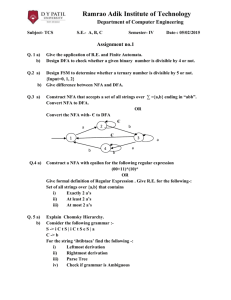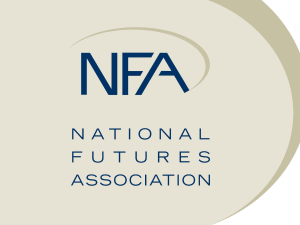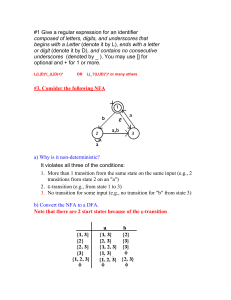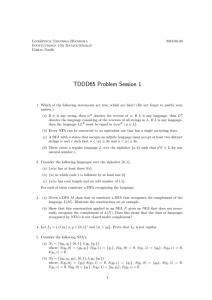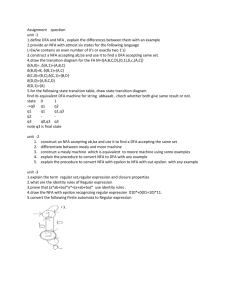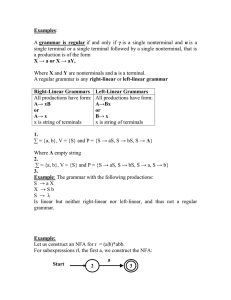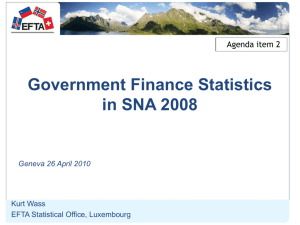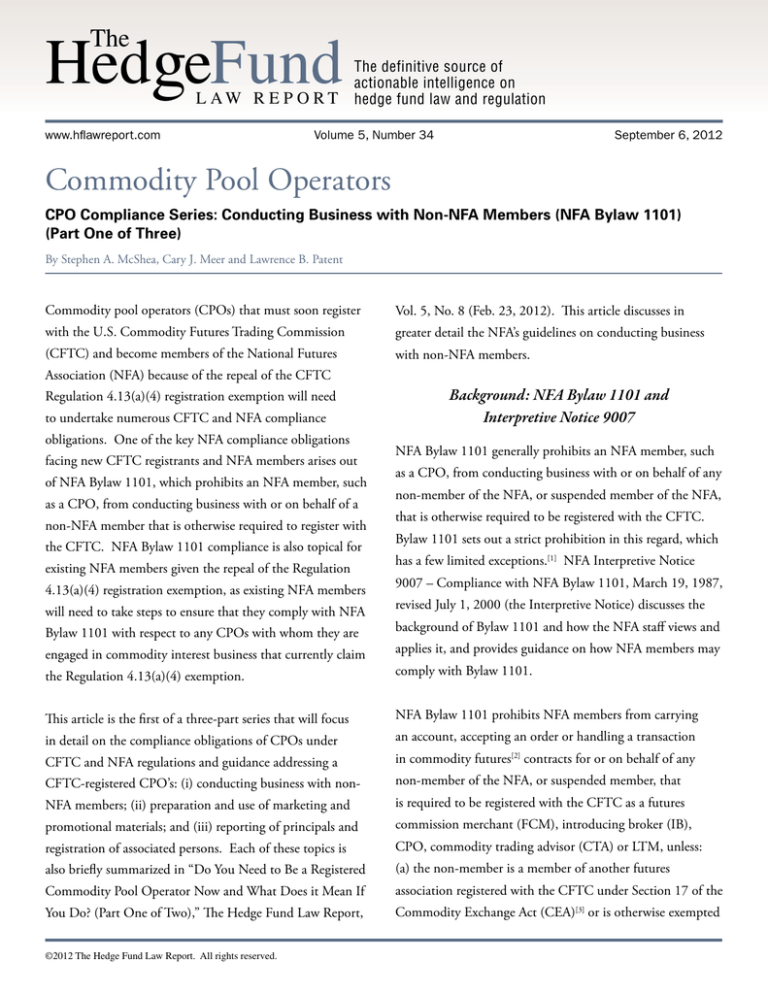
HedgeFund
The
L AW R E P O RT
www.hflawreport.com
The definitive source of
actionable intelligence on
hedge fund law and regulation
Volume 5, Number 34
September 6, 2012
Commodity Pool Operators
CPO Compliance Series: Conducting Business with Non-NFA Members (NFA Bylaw 1101)
(Part One of Three)
By Stephen A. McShea, Cary J. Meer and Lawrence B. Patent
Commodity pool operators (CPOs) that must soon register
Vol. 5, No. 8 (Feb. 23, 2012). This article discusses in
with the U.S. Commodity Futures Trading Commission
greater detail the NFA’s guidelines on conducting business
(CFTC) and become members of the National Futures
with non-NFA members.
Association (NFA) because of the repeal of the CFTC
Regulation 4.13(a)(4) registration exemption will need
to undertake numerous CFTC and NFA compliance
obligations. One of the key NFA compliance obligations
facing new CFTC registrants and NFA members arises out
of NFA Bylaw 1101, which prohibits an NFA member, such
as a CPO, from conducting business with or on behalf of a
non-NFA member that is otherwise required to register with
the CFTC. NFA Bylaw 1101 compliance is also topical for
existing NFA members given the repeal of the Regulation
4.13(a)(4) registration exemption, as existing NFA members
will need to take steps to ensure that they comply with NFA
Bylaw 1101 with respect to any CPOs with whom they are
engaged in commodity interest business that currently claim
Background: NFA Bylaw 1101 and
Interpretive Notice 9007
NFA Bylaw 1101 generally prohibits an NFA member, such
as a CPO, from conducting business with or on behalf of any
non-member of the NFA, or suspended member of the NFA,
that is otherwise required to be registered with the CFTC.
Bylaw 1101 sets out a strict prohibition in this regard, which
has a few limited exceptions.[1] NFA Interpretive Notice
9007 – Compliance with NFA Bylaw 1101, March 19, 1987,
revised July 1, 2000 (the Interpretive Notice) discusses the
background of Bylaw 1101 and how the NFA staff views and
applies it, and provides guidance on how NFA members may
the Regulation 4.13(a)(4) exemption.
comply with Bylaw 1101.
This article is the first of a three-part series that will focus
NFA Bylaw 1101 prohibits NFA members from carrying
in detail on the compliance obligations of CPOs under
an account, accepting an order or handling a transaction
CFTC and NFA regulations and guidance addressing a
in commodity futures[2] contracts for or on behalf of any
CFTC-registered CPO’s: (i) conducting business with non-
non-member of the NFA, or suspended member, that
NFA members; (ii) preparation and use of marketing and
is required to be registered with the CFTC as a futures
promotional materials; and (iii) reporting of principals and
commission merchant (FCM), introducing broker (IB),
registration of associated persons. Each of these topics is
CPO, commodity trading advisor (CTA) or LTM, unless:
also briefly summarized in “Do You Need to Be a Registered
(a) the non-member is a member of another futures
Commodity Pool Operator Now and What Does it Mean If
association registered with the CFTC under Section 17 of the
You Do? (Part One of Two),” The Hedge Fund Law Report,
Commodity Exchange Act (CEA)[3] or is otherwise exempted
©2012 The Hedge Fund Law Report. All rights reserved.
HedgeFund
The
L AW R E P O RT
www.hflawreport.com
The definitive source of
actionable intelligence on
hedge fund law and regulation
Volume 5, Number 34
September 6, 2012
from the Bylaw 1101 prohibition by NFA Board resolution;
NFA Interpretive Notice 9007 – Compliance with NFA
(b) the non-member is registered with the CFTC as a FCM
Bylaw 1101 is available in the NFA’s online Manual/Rules on
or IB under Section 4f(a)(2) of the CEA and the account,
this webpage.
order or transaction involves only security futures products; or
How to Comply
(c) the suspended member has been exempted from the Bylaw
1101 prohibition by the NFA Appeals Committee.
Two key determinations are necessary for compliance with
The complete text of Bylaw 1101 is available in the NFA’s
Bylaw 1101: (i) whether you are doing business with an entity
online Manual/Rules on this webpage.
that is required to be registered with the CFTC; and (ii) if such
registration is required, is that entity an NFA member. The
In the Interpretive Notice, the NFA highlights the importance
of Bylaw 1101 within the NFA’s regulatory structure, noting
that its prohibitions on conducting business with non-NFA
members is of such critical importance to the NFA that those
prohibitions are included as one of the NFA’s fundamental
purposes in its Articles of Incorporation. The Interpretive
Notice makes clear that, although Bylaw 1101 by its terms
imposes a strict liability standard on NFA members, the NFA
staff has not enforced Bylaw 1101 unreasonably and has
“consistently not relied on the strict liability standard set by
the rule itself.” Instead, the Interpretive Notice indicates that
complaints in Bylaw 1101 cases have been issued by the NFA
staff in instances where in the staff’s view “evidence indicates
that the Member knew or should have known of the violation.”
The Interpretive Notice then makes clear that the determination
of whether a member should have known will largely depend
on the adequacy of the procedures that it has in place to prevent
Interpretive Notice sets out “certain minimal steps” that NFA
members should take to comply with Bylaw 1101. The relevant
steps for CPOs set out in the Interpretive Notice are as follows:
• Review the list of CFTC registrants with which you
do business to determine if they are NFA Members.
You can determine whether a particular entity is a
CFTC registrant by checking the BASIC system on
NFA’s website, sending a request to NFA through
the “contact” feature on the website, or calling NFA’s
Information Center toll-free at (800) 621-3570;
• Review your list of customers (i.e., investors). If a
customer’s name indicates that it may be engaged
in the futures business, you should inquire as to its
registration and membership status;
• If any customer is operating a commodity pool but
Bylaw 1101 violations and the diligence with which it carries
claims to be exempt from registration as a CPO, you
out those procedures. To that end, the Interpretive Notice sets
should verify that the customer has made any required
out steps that the NFA suggests its members can take to help
filings with the CFTC and NFA;[4] and
ensure compliance with Bylaw 1101, which are included in the
• Either ensure that your branch offices are not
discussion below under “How to Comply.” When conducting
separately incorporated entities, or, if they are, that
routine exams of its members, the NFA will ask for copies or
they are registered in the appropriate capacity with
examples of a member’s procedures for Bylaw 1101 compliance.
the CFTC.
©2012 The Hedge Fund Law Report. All rights reserved.
HedgeFund
The
L AW R E P O RT
www.hflawreport.com
The definitive source of
actionable intelligence on
hedge fund law and regulation
Volume 5, Number 34
September 6, 2012
As the NFA points out in the Interpretive Notice, it is
The Investor hereby certifies that (Please check all of the
important for CPOs to keep in mind that these steps are not
appropriate boxes):
necessarily a complete list of all the procedures that may be
necessary to avoid a violation of Bylaw 1101 and following
[__] The Investor (or, if the Investor is a commodity
them may not as a matter of course prevent a violation of
pool, the operator thereof ) is a member of NFA and
Bylaw 1101. Following these steps from the Interpretive
is registered under the CEA as a: _____________
Notice, however, should go a long way in helping a CPO to
______________________. (Please indicate the
satisfy its Bylaw 1101 compliance obligations and to avoid
category or categories in which the Investor, or the
liability for a violation of Bylaw 1101.
operator thereof, is so registered, and its NFA ID
number. Registration categories include commodity
Beyond following the steps set out in the Interpretive Notice,
pool operator, commodity trading advisor, futures
CPOs can take other affirmative steps by seeking information
commission merchant, introducing broker, and retail
and representations in materials such as their funds’
foreign exchange dealer.)
subscription agreements and contracts with third-parties such
as distributors.
CPOs managing private funds should include in their
subscription agreements a representation concerning an
investor’s CFTC registration and/or exemption status. The
NFA has looked to this in examinations as a valid procedure
for complying with Bylaw 1101. The following is an example
of what such an item might look like:
In order to be in compliance with applicable rules of the
National Futures Association (“NFA”) and the regulations
of the Commodity Futures Trading Commission
(“CFTC”), _________ (the “Investment Manager”) must
ensure that each investor in the Fund (“Investor”) that is
required to register under the U.S. Commodity Exchange
Act (“CEA”) and to become a member of NFA has done
[__] (If the Investor is a commodity pool operator
or commodity trading advisor but is exempt from
registration as such) The Investor (and the pool
operator of the Investor in the case of a commodity
pool) represents that it is exempt from registration under
the CEA pursuant to ___________ and has made any
necessary filings with the NFA in order to avail itself of
such exemption. (Please cite the section of the CEA
or CFTC Regulation under which exemption from
registration is claimed.)
[__] The Investor represents that it is not required to
be a member of NFA or to be registered under the CEA
because it does not engage in activity that comes within
the definition of any of the registration categories stated
in bold above.
so. The Investor must check the statement(s) below that
The Investor covenants to advise the Investment
apply to the Investor (or, if the Investor is a commodity
Manager immediately in writing if any warranty or any
pool, to the operator thereof ):
information contained herein becomes untrue.
©2012 The Hedge Fund Law Report. All rights reserved.
HedgeFund
The
L AW R E P O RT
www.hflawreport.com
The definitive source of
actionable intelligence on
hedge fund law and regulation
Volume 5, Number 34
September 6, 2012
With respect to third-party arrangements such as distribution
Appeals Committee (each of (i), (ii) and (iii) collectively,
agreements, CPOs may wish to include representations from the
the “Bylaw 1101 Exemptions”).
counterparty as to its CFTC registration and NFA membership
status. An example of such a representation is as follows:
(c)
Distributor (i) is not subject to the Required
CFTC Registrations, (ii) is properly registered pursuant
NFA Bylaw 1101 Representation. The Distributor
to one of the Required CFTC Registrations and is an
represents and warrants to the Funds and the Investment
NFA member, or (iii) satisfies one of the Bylaw 1101
Manager and agrees with the Funds and the Investment
Exemptions. (Modify as appropriate to indicate the basis
Manager as follows:
pursuant to which this clause (c) is satisfied.)
(a)
The Distributor acknowledges that the manager is
Finally, in connection with the repeal of the exemption from
registered as a commodity pool operator (“CPO”) with the
CPO registration in CFTC Regulation 4.13(a)(4), NFA
Commodity Futures Trading Commission (“CFTC”) and
Members currently engaging in commodity interest business
a member of the National Futures Association (“NFA”).
with an exempt Regulation 4.13(a)(4) pool must ensure that,
after December 31, 2012, the operator is either registered as a
(b)
As a registered CPO and NFA member,
the Manager is subject to NFA Bylaw 1101, which
prohibits NFA members from engaging in transactions
in commodity futures contracts (directly or through the
Funds) for or on behalf of any non-Member of the NFA,
or suspended Member, that is required to be registered
with the CFTC as a futures commission merchant
(“FCM”), introducing broker (“IB”), CPO, commodity
trading advisor or leverage transaction merchant
(collectively, the “Required CFTC Registrations”), unless
(i) such non-Member of the NFA is a member of another
futures association registered with the CFTC under
CPO and an NFA member, the operator has filed an exemption
for the pool under CFTC Regulation 4.13(a)(3) or the operator
is exempt on another basis. In order to assist its members in
identifying such entities, the NFA has made available through
the Annual Questionnaire that its members must complete
once a year a listing of all Regulation 4.13(a)(4) and 4.13
No Action exemptions filed to date with NFA (which will be
updated periodically to reflect any new filings received). The
NFA distributed a notice to its members on August 15, 2012
indicating that this list has been included on the Questionnaire
Index screen as a link at the bottom of the screen.
Section 17 of the Commodity Exchange Act (the “CEA”),
Stephen A. McShea is the General Counsel and Chief Compliance
or is otherwise exempted from this prohibition, (ii) such
Officer of Larch Lane Advisors LLC, a CFTC-registered CPO and
non-Member of the NFA is registered with the CFTC
SEC-registered investment adviser, that specializes in early-stage
as an FCM or IB under Section 4f(a)(2) of the CEA and
investing through its funds of hedge fund platform and its hedge fund
the account, order, or transaction involves only security
seeding platform. In his role at Larch Lane, Mr. McShea manages and
futures products, or (iii) such suspended Member is
supervises all legal and regulatory operations of Larch Lane, including:
exempted from the NFA Bylaw 1101 prohibition by the
structuring domestic and offshore private funds of funds offerings and
©2012 The Hedge Fund Law Report. All rights reserved.
HedgeFund
The
L AW R E P O RT
www.hflawreport.com
The definitive source of
actionable intelligence on
hedge fund law and regulation
Volume 5, Number 34
September 6, 2012
managing the funds’ ongoing compliance obligations; negotiating and
commodity futures, financial services and derivatives matters. Mr.
structuring founder class and seed investments in start-up and early-
Patent’s experience includes substantial involvement with all of the
stage hedge funds; structuring credit facilities for domestic and offshore
Commodity Futures Trading Commission regulations related to
funds; implementing compliance policies and procedures; and preparing
intermediaries, including registration and fitness, sales practices,
SEC and NFA filings. Mr. McShea is also an Adjunct Professor of
disclosure, reporting, recordkeeping, minimum financial requirements,
Law at Fordham University School of Law, where he teaches a class on
customer funds protection, international trading, foreign currency, anti-
investment adviser and hedge fund regulation.
money laundering, bankruptcy, risk assessment and managed funds.
Cary J. Meer is a partner in K&L Gates’ Washington, D.C. office and
a member of the Investment Management practice group. She provides
compliance advice to registered investment advisers and assists firms
in registering as investment advisers, commodity pool operators and
commodity trading advisors. She also structures and organizes private
investment companies, including hedge and private equity funds and
funds of funds.
[1]
NFA Bylaw 1101 also has a section that deals with leverage
transaction merchants (LTMs), but as there are no firms
currently registered as such, this section is no longer relevant.
[2]
As defined in NFA Bylaw 1507, the term “futures” includes
commodity options, foreign futures and options, leverage
transactions and security futures products.
[3]
NFA is currently the only registered futures association, so
there is no need to check if the entity is a member of another
futures association.
Lawrence B. Patent is of counsel in K&L Gates’ Washington, D.C.
[4]
office. Prior to joining K&L Gates, Mr. Patent was Deputy Director
be commodity pools, so the operators thereof do not need to
of the CFTC’s Division of Clearing and Intermediary Oversight.
make filings with the NFA to maintain their CPO exemption.
His principal areas of concentration are investment management,
See CFTC Regulation 4.5(a)(4)(i) – (v).
©2012 The Hedge Fund Law Report. All rights reserved.
Note certain employee benefit plans are considered not to

